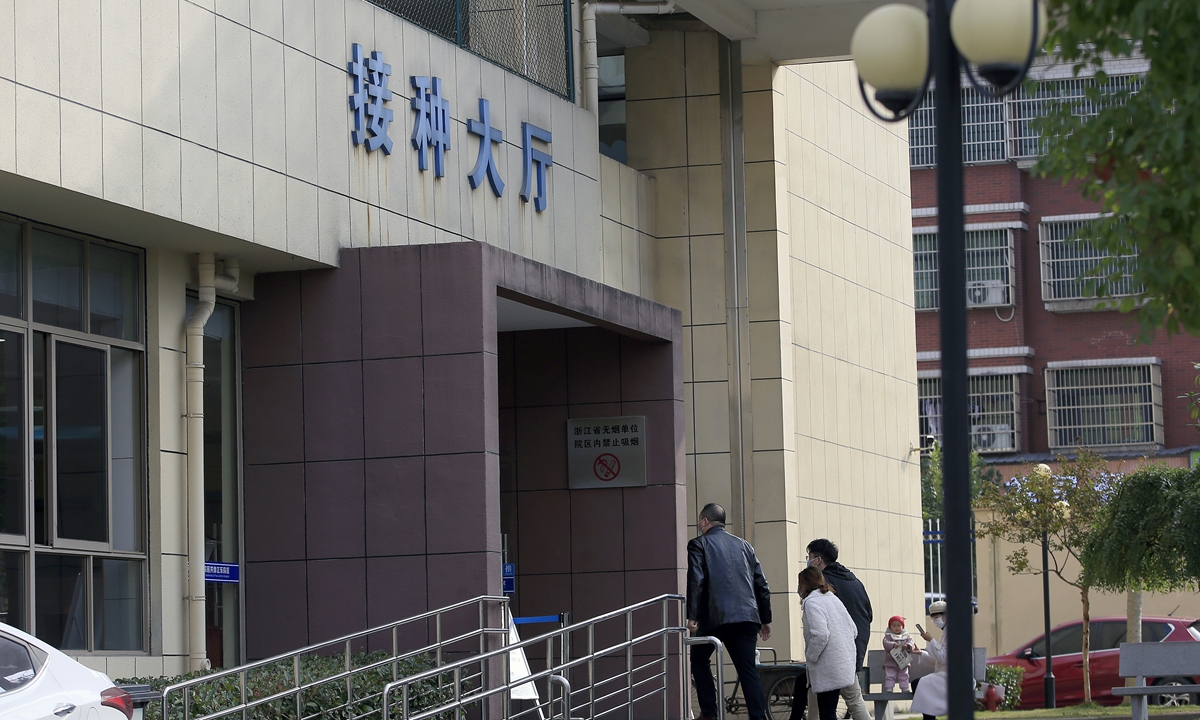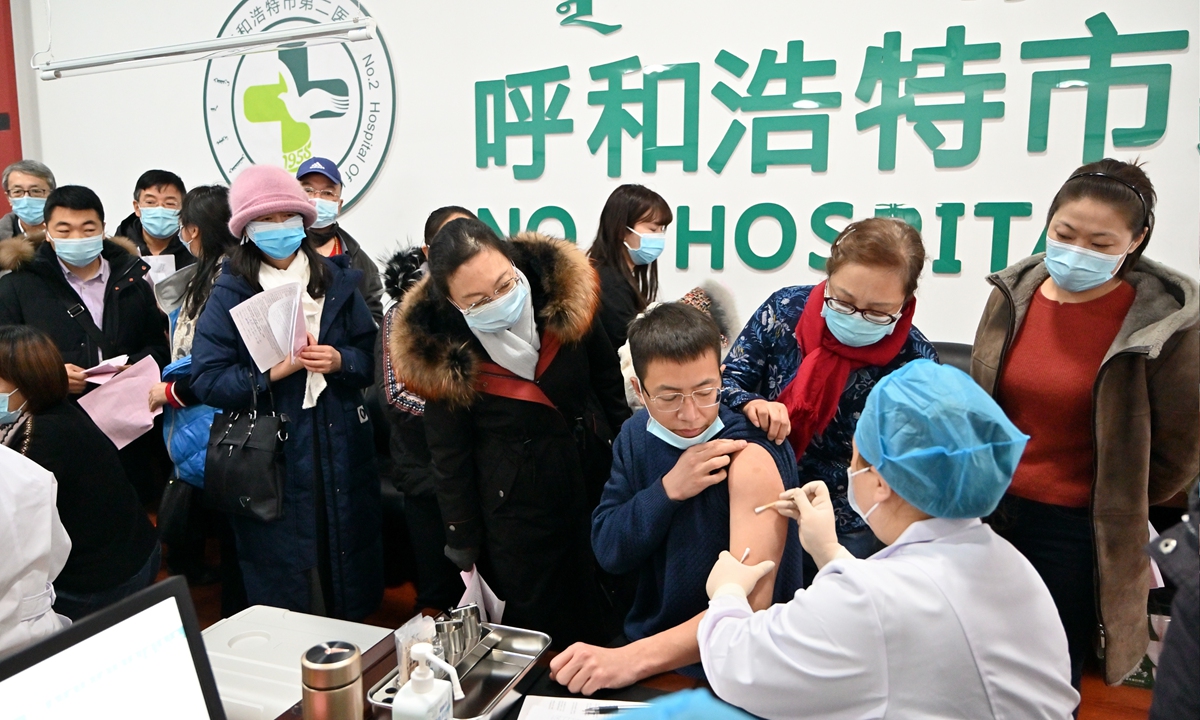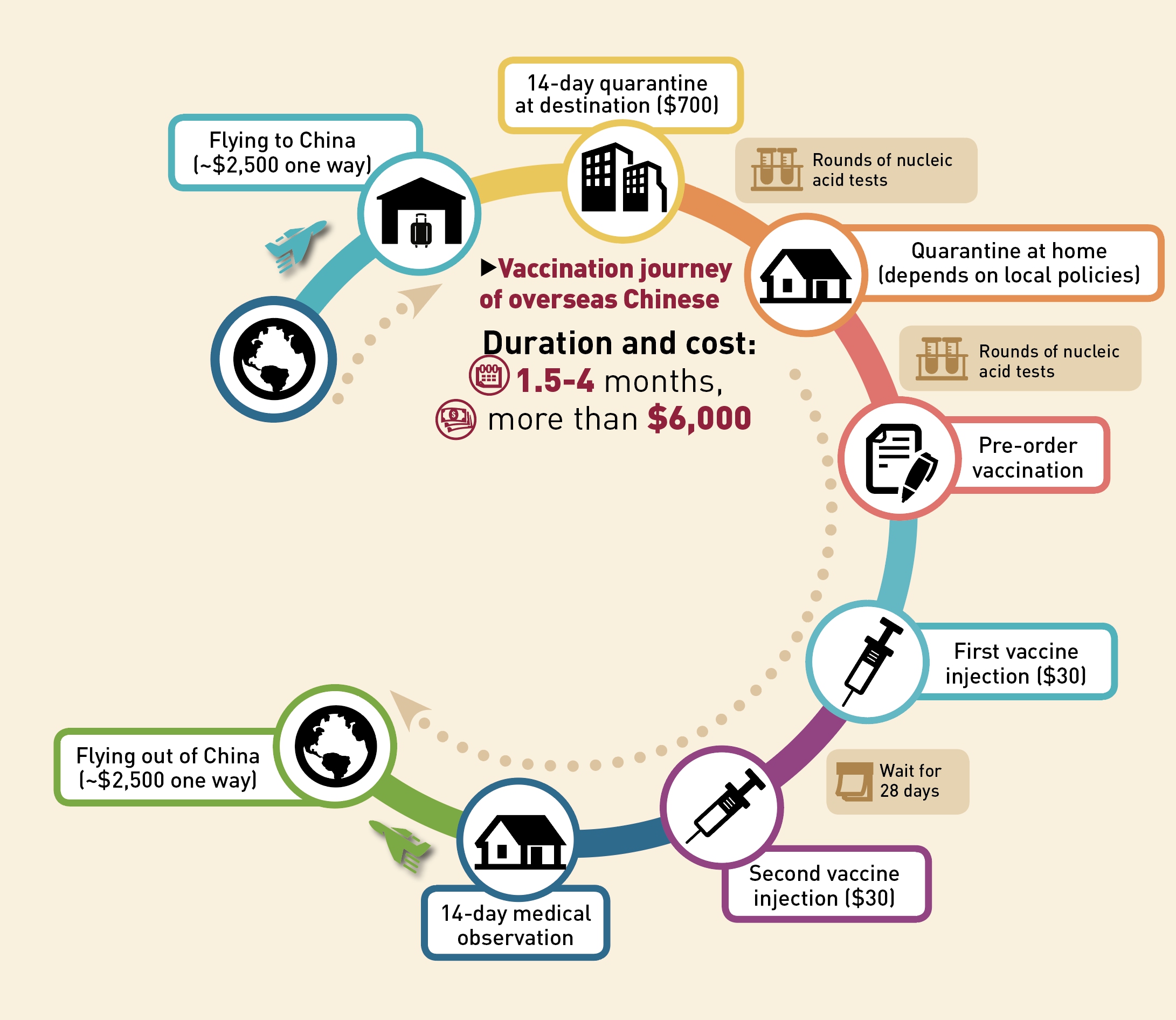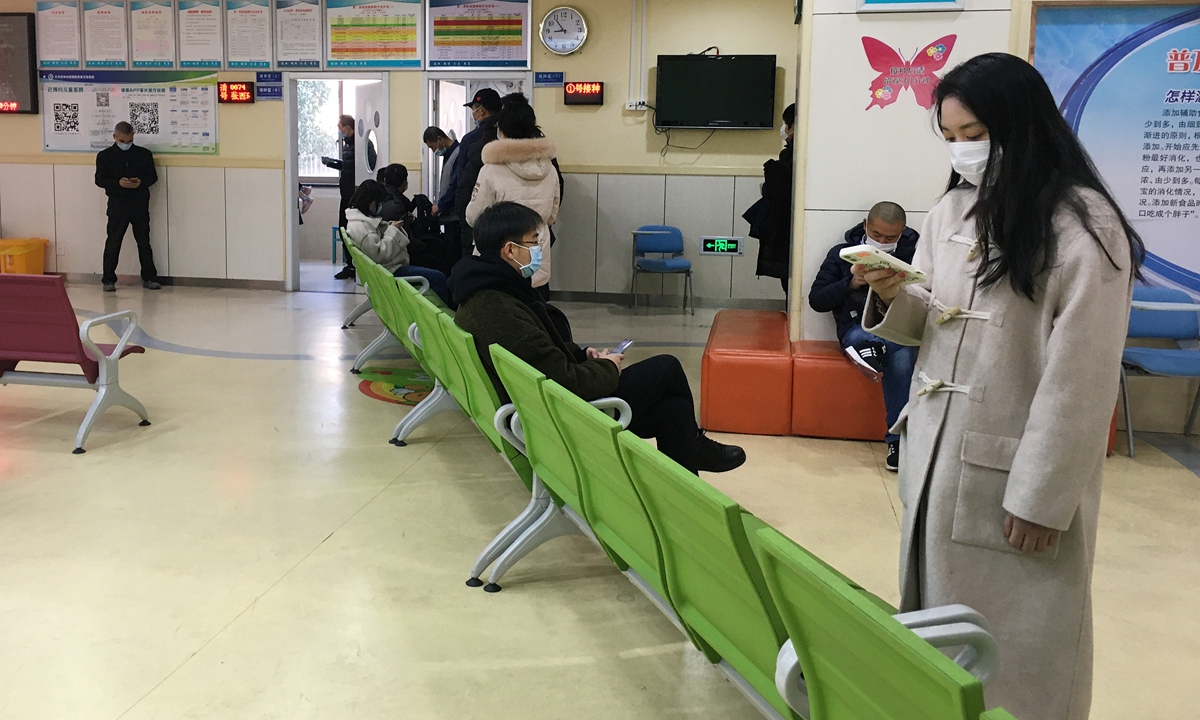Chinese living overseas flock back home for COVID-19 vaccination, a vote of confidence in domestic vaccines
By Lin Xiaoyi, Lu Yameng, Hu Yuwei and Shan Jie Source: Global Times Published: 2020/12/28 19:37:37
As the COVID-19 pandemic rages across the world, vaccines have become a life-saving straw that many people are eager to grasp. But at the moment, the availability is limited and the first batches are earmarked for those in the most urgent need, such as medical staff and senior citizens.
In China, one of the leading countries in COVID-19 vaccine development, the government has been arranging vaccination for priority groups such as frontline health workers, inspection and quarantine officers at ports of entry, and personnel bound overseas for work.
However, a considerable number of Chinese living overseas have recently returned to China in order to get vaccinated.
The journey costs a lot of money and time but many believe it's worth it, people familiar with the situation told the Global Times.
The fact that some Chinese are flying back home for vaccination despite having alternative choices in the US or Europe also reflects the Chinese people's growing confidence in domestically produced vaccines, experts on vaccines told the Global Times.
China's five vaccine candidates are now undergoing their phase III clinical trials in more than 16 countries.

Expressions of confidence
"Sharing the experience of going back to China to get the coronavirus vaccine on social media accounts has become one of the most popular forms of bragging," Catherine Zhu (pseudonym), a naturalized Swiss citizen living in Zurich who is originally from China, told the Global Times.
Zhu spent nearly 70,000 yuan ($10,710) to get a one-way ticket back to China from Switzerland in late October, completing coronavirus nucleic acid and antibody tests with negative results within 48 hours before boarding, facing the possible risk of infection on the plane, and finally going through 14 days of quarantine. After getting the second dose of the COVID-19 vaccine made by China's Sinovac Biotech, Zhu said she thought all the tedious procedures of returning home were worthwhile.
"In Switzerland, the high number of new COVID-19 cases and the difficulty in availing the vaccine made me anxious all the time. Although we were reading in the media every day that the vaccine was coming, we were well aware of the fact that priority would be given to people over the age of 80," said Zhu.
"I decided to go back to China to get vaccinated at the first chance I had," she added, revealing her enthusiasm to return after seeing reports that COVID-19 vaccines produced by Chinese enterprises had passed biosafety inspection and proven to be effective, with minor side effects.
According to Zhu, there are currently many channels for overseas Chinese coming to China to make an appointment for vaccination, including booking appointments through local federations of returned overseas Chinese, community management departments and companies.
Zhu said she felt very lucky that she had no adverse reactions from the vaccine. In China, she was free to visit relatives and friends without any restrictions or pressures, and even went to the 3rd China International Import Expo (CIIE).
Zhu has returned to Switzerland where travelers from China are able to pass through customs quickly and return home without having to undergo quarantine and nucleic acid tests.
"For me, getting the vaccine is like wearing an armor. Although I will continue to wear a mask, wash my hands frequently and practice social distancing in the face of the severe epidemic situation in Europe, I know that there is a force from my motherland protecting me, which makes me feel extremely relieved," Zhu said.

Favorable policies
China has begun the vaccination for urgent use and will gradually open it to the public. For overseas Chinese, there have been favorable policies.
As early as in late October, several regions in East China's Zhejiang Province have provided preorder channels of COVID-19 vaccination for overseas Chinese, and some of them had already taken the injections.Qingtian county in East China's Zhejiang Province has a registered population of 570,000, but it is the hometown of more than 300,000 Chinese living overseas, including 100,000 in Italy.
Xu Xiaolin, head of the Qingtian clansman association in Italy, told the Global Times on Sunday that for overseas Chinese, vaccine is the solution for the pandemic, which has attracted Qingtian people living in Italy to take a round-trip to China for vaccination, especially those doing business. "As far as I know, several hundreds of Qingtian people in Italy have flown back for vaccination," said Xu.
The trip is not cheap. According to Xu, a one-way flight ticket is about $2,500, and the quarantine cost for a fortnight is at least $700. "The vaccines are not expensive though, only 400 yuan for two doses."
But the time consumed in the process is more notable. "For some people, it takes three or four months to complete the whole process," Xu said.
It is recommended that the first injection and the second injection be separated by 28 days. If you are in a rush to go abroad, the interval can be shortened to 14 days, an official responsible for overseas Chinese affairs at the Epidemic Prevention and Control Headquarters of Qingtian, told the Global Times.

Those who have returned from overseas can make an appointment for vaccines at the earliest after 14 days of medical observation at the port of entry and seven days of health observation at home, along with a negative nucleic acid test result, he said.
Xu's association has been helping Qingtian people in Italy to understand the favorable policies of Zhejiang. "We are also communicating the needs of Chinese people in Italy to the Chinese government," he said.At present, the emergency vaccination program in Qingtian county is mainly aimed at people from Qingtian who need to go abroad urgently and are aged between 18 and 59, the Qingtian Overseas Chinese Federation said in a response to a netizen asking whether the inoculation can be done before going abroad in March 2021 on the local government website.
"The COVID-19 vaccine inoculation is open to all the people who were born in Qingtian or whose native place of (ancestral) origin lies in Qingtian. They can choose to register for COVID-19 vaccination voluntarily," according to the official.
Eligible residents should carry their passport or ID card and register at the Comprehensive Service Station of the Epidemic Prevention and Control Headquarters of Qingtian county. After registration, the government will purchase vaccines, and when the vaccines arrive, the registered residents can get the injection after being notified of the place and time, according to the official.
"Registration was opened in late September. The first batch of people got vaccinated on October 9 at nine vaccination sites in Qingtian county. More than 4,000 people have been vaccinated until now."
"The main purpose of inoculation is to protect Chinese people who plan to go overseas," said the official.

In past decades, many Chinese people preferred to use vaccines produced by Western pharmaceutical giants if they had a choice. However, observers suggested that the COVID-19 vaccine has witnessed a change in preference among many Chinese people partly due to the improvement of vaccine technology and regulation in China, which has boosted such confidence.
"We Chinese in Italy recognize the COVID-19 vaccines developed by China very well and have confidence in its safety and effectiveness. China's vaccines are good news to the world," Xu said.
China's vaccine makers have been at a low ebb in recent years after a number of scandals including Changsheng Bio-technology Co's fabrication of data and sales of substandard vaccines for babies in 2018, which wrecked public trust and infuriated parents. Now things appear to be changing as a number of promising COVID-19 vaccines have helped the sector regain public confidence.
Representatives of both Sinopharm and Sinovac have previously told the Global Times that China's drug regulators review their phase III clinical trial data following a rigorous standard that is even stricter than many Western countries.
The previous vaccine crisis indeed dented Chinese people's faith in the state-owned immunological products and glorified foreign biological products as well as Western regulators, experts said. However, China's vaccine industry that was scarred by quality risks and scandals is now properly regulated, whereas Western countries' fragile response to the pandemic has smashed many Chinese people's trust in Western solutions, they said.
Newspaper headline: Home advantage
In China, one of the leading countries in COVID-19 vaccine development, the government has been arranging vaccination for priority groups such as frontline health workers, inspection and quarantine officers at ports of entry, and personnel bound overseas for work.
However, a considerable number of Chinese living overseas have recently returned to China in order to get vaccinated.
The journey costs a lot of money and time but many believe it's worth it, people familiar with the situation told the Global Times.
The fact that some Chinese are flying back home for vaccination despite having alternative choices in the US or Europe also reflects the Chinese people's growing confidence in domestically produced vaccines, experts on vaccines told the Global Times.
China's five vaccine candidates are now undergoing their phase III clinical trials in more than 16 countries.

The vaccination center in Yiwu, East China's Zhejiang Photos: Yang Hui/GT
Expressions of confidence
"Sharing the experience of going back to China to get the coronavirus vaccine on social media accounts has become one of the most popular forms of bragging," Catherine Zhu (pseudonym), a naturalized Swiss citizen living in Zurich who is originally from China, told the Global Times.
Zhu spent nearly 70,000 yuan ($10,710) to get a one-way ticket back to China from Switzerland in late October, completing coronavirus nucleic acid and antibody tests with negative results within 48 hours before boarding, facing the possible risk of infection on the plane, and finally going through 14 days of quarantine. After getting the second dose of the COVID-19 vaccine made by China's Sinovac Biotech, Zhu said she thought all the tedious procedures of returning home were worthwhile.
"In Switzerland, the high number of new COVID-19 cases and the difficulty in availing the vaccine made me anxious all the time. Although we were reading in the media every day that the vaccine was coming, we were well aware of the fact that priority would be given to people over the age of 80," said Zhu.
"I decided to go back to China to get vaccinated at the first chance I had," she added, revealing her enthusiasm to return after seeing reports that COVID-19 vaccines produced by Chinese enterprises had passed biosafety inspection and proven to be effective, with minor side effects.
According to Zhu, there are currently many channels for overseas Chinese coming to China to make an appointment for vaccination, including booking appointments through local federations of returned overseas Chinese, community management departments and companies.
Zhu said she felt very lucky that she had no adverse reactions from the vaccine. In China, she was free to visit relatives and friends without any restrictions or pressures, and even went to the 3rd China International Import Expo (CIIE).
Zhu has returned to Switzerland where travelers from China are able to pass through customs quickly and return home without having to undergo quarantine and nucleic acid tests.
"For me, getting the vaccine is like wearing an armor. Although I will continue to wear a mask, wash my hands frequently and practice social distancing in the face of the severe epidemic situation in Europe, I know that there is a force from my motherland protecting me, which makes me feel extremely relieved," Zhu said.

People take COVID-19 vaccine in Hohhot, North China's Inner Mongolia on Monday. Photo: cnsphoto
Favorable policies
China has begun the vaccination for urgent use and will gradually open it to the public. For overseas Chinese, there have been favorable policies.
As early as in late October, several regions in East China's Zhejiang Province have provided preorder channels of COVID-19 vaccination for overseas Chinese, and some of them had already taken the injections.Qingtian county in East China's Zhejiang Province has a registered population of 570,000, but it is the hometown of more than 300,000 Chinese living overseas, including 100,000 in Italy.
Xu Xiaolin, head of the Qingtian clansman association in Italy, told the Global Times on Sunday that for overseas Chinese, vaccine is the solution for the pandemic, which has attracted Qingtian people living in Italy to take a round-trip to China for vaccination, especially those doing business. "As far as I know, several hundreds of Qingtian people in Italy have flown back for vaccination," said Xu.
The trip is not cheap. According to Xu, a one-way flight ticket is about $2,500, and the quarantine cost for a fortnight is at least $700. "The vaccines are not expensive though, only 400 yuan for two doses."
But the time consumed in the process is more notable. "For some people, it takes three or four months to complete the whole process," Xu said.
It is recommended that the first injection and the second injection be separated by 28 days. If you are in a rush to go abroad, the interval can be shortened to 14 days, an official responsible for overseas Chinese affairs at the Epidemic Prevention and Control Headquarters of Qingtian, told the Global Times.

GT
Those who have returned from overseas can make an appointment for vaccines at the earliest after 14 days of medical observation at the port of entry and seven days of health observation at home, along with a negative nucleic acid test result, he said.
Xu's association has been helping Qingtian people in Italy to understand the favorable policies of Zhejiang. "We are also communicating the needs of Chinese people in Italy to the Chinese government," he said.At present, the emergency vaccination program in Qingtian county is mainly aimed at people from Qingtian who need to go abroad urgently and are aged between 18 and 59, the Qingtian Overseas Chinese Federation said in a response to a netizen asking whether the inoculation can be done before going abroad in March 2021 on the local government website.
"The COVID-19 vaccine inoculation is open to all the people who were born in Qingtian or whose native place of (ancestral) origin lies in Qingtian. They can choose to register for COVID-19 vaccination voluntarily," according to the official.
Eligible residents should carry their passport or ID card and register at the Comprehensive Service Station of the Epidemic Prevention and Control Headquarters of Qingtian county. After registration, the government will purchase vaccines, and when the vaccines arrive, the registered residents can get the injection after being notified of the place and time, according to the official.
"Registration was opened in late September. The first batch of people got vaccinated on October 9 at nine vaccination sites in Qingtian county. More than 4,000 people have been vaccinated until now."
"The main purpose of inoculation is to protect Chinese people who plan to go overseas," said the official.

The vaccination center in Yiwu, East China's Zhejiang Photos: Yang Hui/GT
Growing confidenceIn past decades, many Chinese people preferred to use vaccines produced by Western pharmaceutical giants if they had a choice. However, observers suggested that the COVID-19 vaccine has witnessed a change in preference among many Chinese people partly due to the improvement of vaccine technology and regulation in China, which has boosted such confidence.
"We Chinese in Italy recognize the COVID-19 vaccines developed by China very well and have confidence in its safety and effectiveness. China's vaccines are good news to the world," Xu said.
China's vaccine makers have been at a low ebb in recent years after a number of scandals including Changsheng Bio-technology Co's fabrication of data and sales of substandard vaccines for babies in 2018, which wrecked public trust and infuriated parents. Now things appear to be changing as a number of promising COVID-19 vaccines have helped the sector regain public confidence.
Representatives of both Sinopharm and Sinovac have previously told the Global Times that China's drug regulators review their phase III clinical trial data following a rigorous standard that is even stricter than many Western countries.
The previous vaccine crisis indeed dented Chinese people's faith in the state-owned immunological products and glorified foreign biological products as well as Western regulators, experts said. However, China's vaccine industry that was scarred by quality risks and scandals is now properly regulated, whereas Western countries' fragile response to the pandemic has smashed many Chinese people's trust in Western solutions, they said.
Newspaper headline: Home advantage